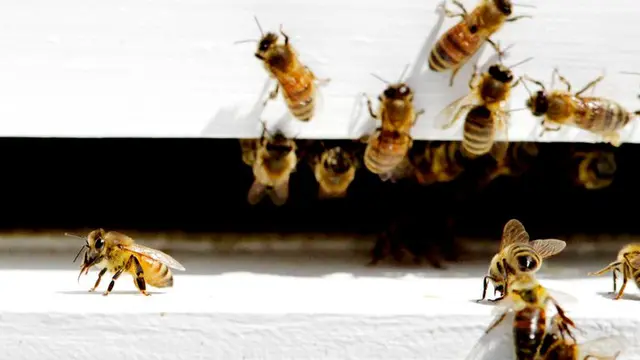Over the past three decades, a single individual bee has successfully created millions of clones of herself thanks to hitting a bizarre genetic jackpot.
This growing army of clones poses a serious risk to the hives of the African lowland honey bee, 10% of which are collapsing every year, as the colonies become filled with clones that consume their resources refuse to share in the work.
Scientists have described the bee's mechanism of reproduction as "incredible" and have traced the lineage back to a single worker bee that lived in 1990, according to research published in the journal Proceedings of the Royal Society B.
It was previously known that the subspecies of Cape honeybee was capable of creating a perfect copy of itself, but this poses serious issues for genetic diversity.
Many forms of social insects are able to reproduce asexually, creating female offspring from unfertilised eggs using two of four chromosomes replicated from their parents.
These chromosomes are reshuffled in the process, meaning that the next generation will be genetically distinct - but there is a limit to how many generations can be reproduced in this way.
Because only two chromosomes are passed on and no new genetic material can be introduced to the next generation, every time a worker bee reproduces in this way the species loses about a third of its genetic material.
This is why most social insects depend on a queen for their reproduction, retaining the genetic diversity of the colony which is constituted of insects that are related.
But a new study has discovered that mutation in Cape honey bee workers is allowing them to pass on all of the genetic information from the four chromosomes from their parents, enabling the subspecies to clone itself for decades - although at the cost of genetic diversity.
Speaking to Live Science, the lead author of the study, Professor Benjamin Oldroyd, described the findings as "incredible" and also "incredibly dysfunctional". "Somehow they've managed to do it. It's insane, I've not heard of anything like this before, anywhere."
It is not clear what the end will be for the clone army, but Professor Oldroyd suggested it is likely to be an evolutionary dead-end, not just because the cloning system suppresses genetic changes but also as the self-interest of the clones might hamper their ability to respond to a catastrophe.
"If you take the queen away, for instance, instead of raising a new queen like other bee species might, these bees will just start laying eggs themselves," Professor Oldroyd told Live Science.
"There are also cells, called queen cells, where the queen lays the eggs containing future queens. It's perfectly possible for a worker to fly in from another colony, or one of the existing workers in that colony to come and replace that queen egg with one of their clone eggs. That way, they can be genetically reincarnated as a queen."
Because the Cape honey bee is reproductive, it does not contribute to any work inside of the hives it infests.
"They just strut around with this attitude like, 'Yeah, you're going to work for me.' It very quickly leads to the collapse of the hive," Professor Oldroyd added.
"As individuals, these clones are quite dysfunctional, so you'd expect them to peter out. But they're a lot like the cells in a tumour in this regard - it doesn't matter if every clone is healthy, so long as enough of them are around to exploit the host."
 简体中文
简体中文

